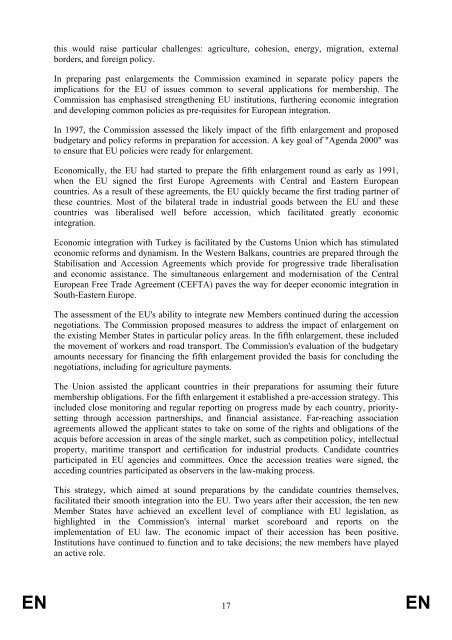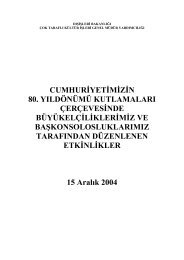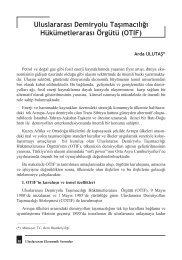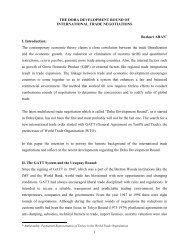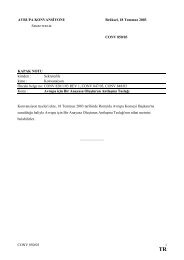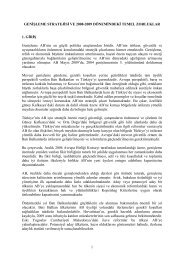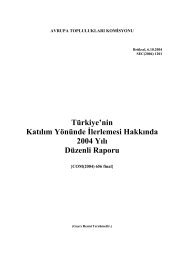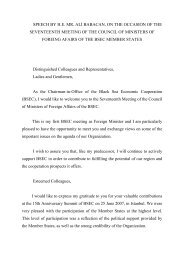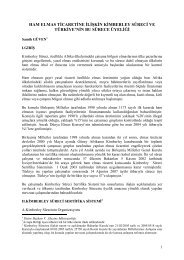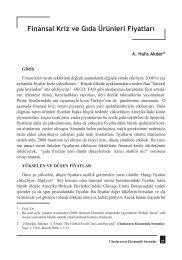Enlargement Strategy and Main Challenges 2006 - 2007
Enlargement Strategy and Main Challenges 2006 - 2007
Enlargement Strategy and Main Challenges 2006 - 2007
Create successful ePaper yourself
Turn your PDF publications into a flip-book with our unique Google optimized e-Paper software.
this would raise particular challenges: agriculture, cohesion, energy, migration, external<br />
borders, <strong>and</strong> foreign policy.<br />
In preparing past enlargements the Commission examined in separate policy papers the<br />
implications for the EU of issues common to several applications for membership. The<br />
Commission has emphasised strengthening EU institutions, furthering economic integration<br />
<strong>and</strong> developing common policies as pre-requisites for European integration.<br />
In 1997, the Commission assessed the likely impact of the fifth enlargement <strong>and</strong> proposed<br />
budgetary <strong>and</strong> policy reforms in preparation for accession. A key goal of "Agenda 2000" was<br />
to ensure that EU policies were ready for enlargement.<br />
Economically, the EU had started to prepare the fifth enlargement round as early as 1991,<br />
when the EU signed the first Europe Agreements with Central <strong>and</strong> Eastern European<br />
countries. As a result of these agreements, the EU quickly became the first trading partner of<br />
these countries. Most of the bilateral trade in industrial goods between the EU <strong>and</strong> these<br />
countries was liberalised well before accession, which facilitated greatly economic<br />
integration.<br />
Economic integration with Turkey is facilitated by the Customs Union which has stimulated<br />
economic reforms <strong>and</strong> dynamism. In the Western Balkans, countries are prepared through the<br />
Stabilisation <strong>and</strong> Accession Agreements which provide for progressive trade liberalisation<br />
<strong>and</strong> economic assistance. The simultaneous enlargement <strong>and</strong> modernisation of the Central<br />
European Free Trade Agreement (CEFTA) paves the way for deeper economic integration in<br />
South-Eastern Europe.<br />
The assessment of the EU's ability to integrate new Members continued during the accession<br />
negotiations. The Commission proposed measures to address the impact of enlargement on<br />
the existing Member States in particular policy areas. In the fifth enlargement, these included<br />
the movement of workers <strong>and</strong> road transport. The Commission's evaluation of the budgetary<br />
amounts necessary for financing the fifth enlargement provided the basis for concluding the<br />
negotiations, including for agriculture payments.<br />
The Union assisted the applicant countries in their preparations for assuming their future<br />
membership obligations. For the fifth enlargement it established a pre-accession strategy. This<br />
included close monitoring <strong>and</strong> regular reporting on progress made by each country, prioritysetting<br />
through accession partnerships, <strong>and</strong> financial assistance. Far-reaching association<br />
agreements allowed the applicant states to take on some of the rights <strong>and</strong> obligations of the<br />
acquis before accession in areas of the single market, such as competition policy, intellectual<br />
property, maritime transport <strong>and</strong> certification for industrial products. C<strong>and</strong>idate countries<br />
participated in EU agencies <strong>and</strong> committees. Once the accession treaties were signed, the<br />
acceding countries participated as observers in the law-making process.<br />
This strategy, which aimed at sound preparations by the c<strong>and</strong>idate countries themselves,<br />
facilitated their smooth integration into the EU. Two years after their accession, the ten new<br />
Member States have achieved an excellent level of compliance with EU legislation, as<br />
highlighted in the Commission's internal market scoreboard <strong>and</strong> reports on the<br />
implementation of EU law. The economic impact of their accession has been positive.<br />
Institutions have continued to function <strong>and</strong> to take decisions; the new members have played<br />
an active role.<br />
EN 17 EN


